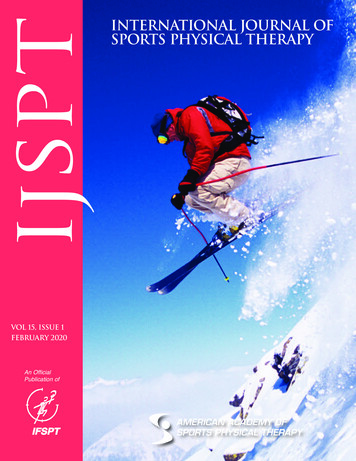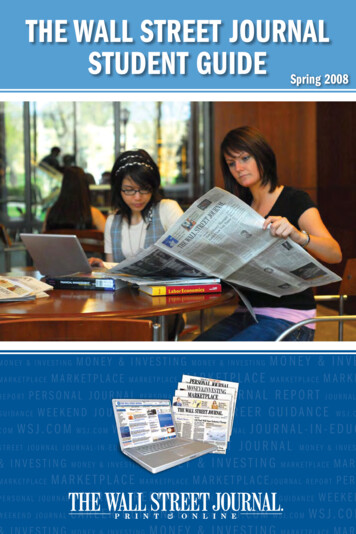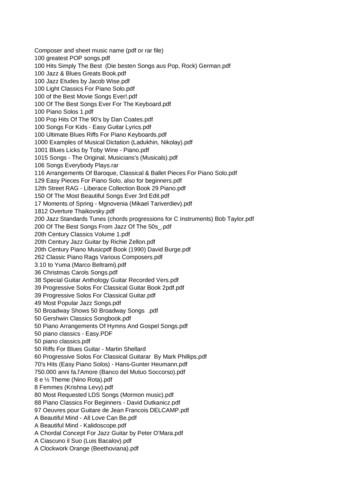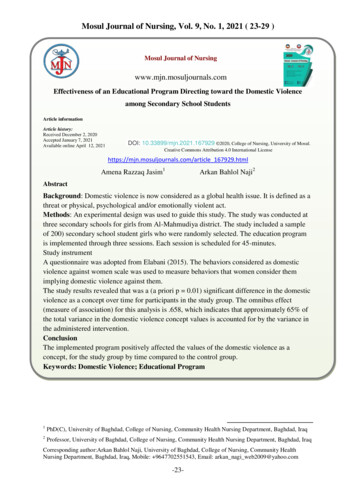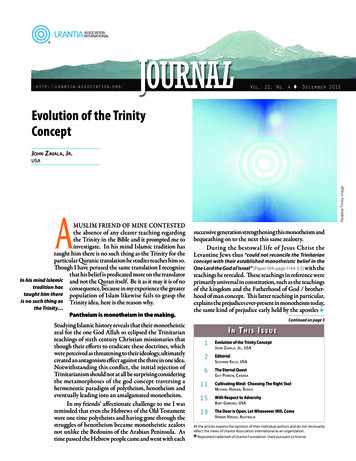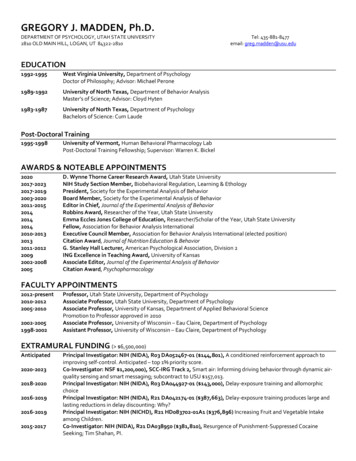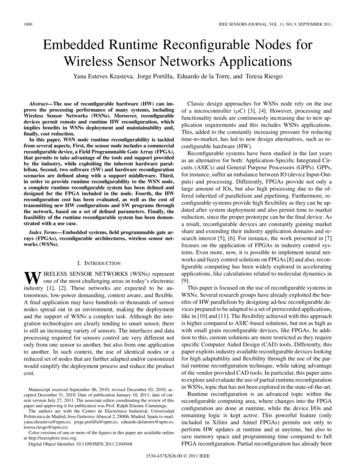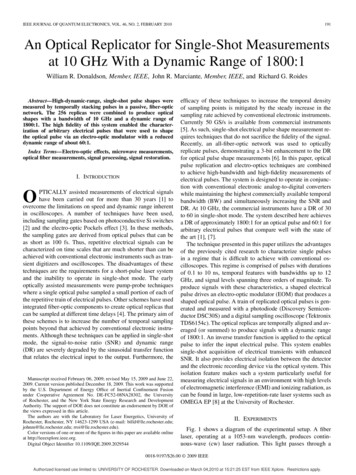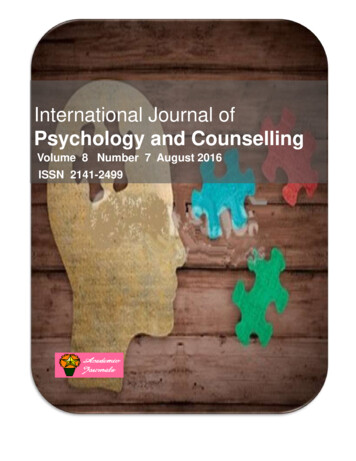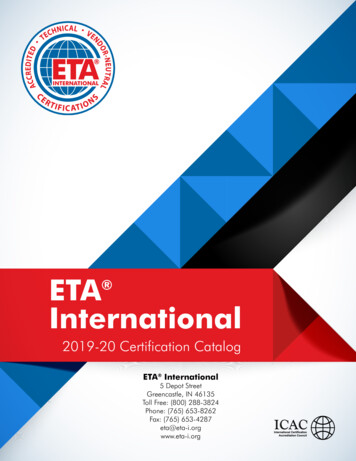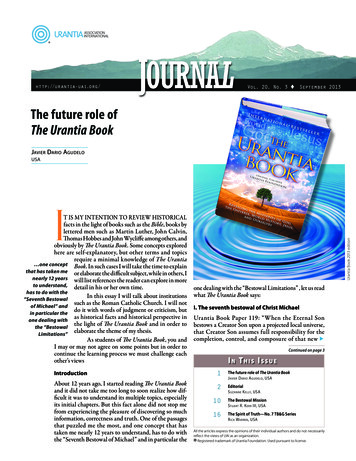
Transcription
ASSOCIATIONINTERNATIONAL http://urantia-uai.org/JOURNALVol. 20, No. 3 September 2013The future role ofThe Urantia BookJavier Dario AgudeloUSAUrantia Book 2013 editionIt is my intention to review historicalfacts in the light of books such as the Bible, books bylettered men such as Martin Luther, John Calvin,Thomas Hobbes and John Wycliffe among others, andobviously by The Urantia Book. Some concepts exploredhere are self-explanatory, but other terms and topicsrequire a minimal knowledge of The Urantia one concept Book. In such cases I will take the time to explainthat has taken me or elaborate the difficult subject, while in others, Inearly 12 years will list references the reader can explore in moreto understand, detail in his or her own time.has to do with theIn this essay I will talk about institutions“Seventh Bestowalsuchasthe Roman Catholic Church. I will notof Michael” anddoitwithwords of judgment or criticism, butin particular theashistoricalfacts and historical perspective inone dealing withthelightofTheUrantia Book and in order tothe “Bestowalelaboratethethemeof my thesis.Limitations”As students of The Urantia Book, you andI may or may not agree on some points but in order tocontinue the learning process we must challenge eachother’s viewsone dealing with the “Bestowal Limitations” , let us readwhat The Urantia Book says:I. The seventh bestowal of Christ MichaelUrantia Book Paper 119: “When the Eternal Sonbestows a Creator Son upon a projected local universe,that Creator Son assumes full responsibility for thecompletion, control, and composure of that new Continued on page 3I n Th i s I s s u eIntroduction1About 12 years ago, I started reading The Urantia Bookand it did not take me too long to soon realize how difficult it was to understand its multiple topics, especiallyits initial chapters. But this fact alone did not stop mefrom experiencing the pleasure of discovering so muchinformation, correctness and truth. One of the passagesthat puzzled me the most, and one concept that hastaken me nearly 12 years to understand, has to do withthe “Seventh Bestowal of Michael” and in particular theThe future role of The Urantia BookJ avier D ario A gudelo , USA2EditorialS uzanne K elly, USA10The Bestowal MissionStuart R. K err III, USA16The Spirit of Truth—No. 7 TB&G SeriesR ick Warren , USAAll the articles express the opinions of their individual authors and do not necessarilyreflect the views of UAI as an organization. Registered trademark of Urantia Foundation. Used pursuant to license.
UAI Journal Vol 20, No 3 September 2013Urantia AssociationInternationalJOURNALEDITORIAL2Journal TeamEditor: Suzanne K ellyskelly@wtmi.netTranslation Coordinator: Suzanne Kellyskelly@wtmi.netTranslation Liaison, French: Alain CyrJean Royer, Jean Annetalain cyr@sympatico.caGreetings fellow UAI Journal readers,In this Edition our threecontributors will focus on theBestowal Mission of Jesus andthe outpouring of the Spirit ofTruth on mankind; and its repercussions not only on our world but allthose worlds now evolving in ourlocal UniverseOur first essay The Future Roleof The Urantia Book by contributorJavier Dario Agudelo, is a thoughtprovoking study of history regardingthe mission and authenticity of Jesus’Bestowal Mission. By comparingthe written words of men on theaccounts of Jesus life on earth, withthose contained in The UrantiaBook, he has substantiated his ownbeliefs in Jesus’ true mission. Javiernow understands the BestowalLimitations and why certain admonitions were given to Jesus, how; “oneadmonition that Jesus followed to theletter, failed miserably and totally inthe hands of men.”Jav ier a lso ta kes us on achronological journey through theevolution of religion, dogma, ritualand the secularist beliefs that haveappeared since the Bestowal. Hepinpoints how The Urantia Bookhas clarified and unified his faithwith his beliefs. “The message of theUB compels us to free ourselves fromdogma as best defined by Steve Jobsas “ living with the results of otherpeople’s thinking,” 1 to free ourselvesfrom ecclesiastical authority, and fromthe shackles of tradition and ritualisticpractices. The UB simply reveals to usthat we are sons of God, and that weare brothers of one common Father,that we are cosmic citizens at thebeginning of an almost everlastingjourney of ascension and progressiontaking us ever closer to God the Father,“The First Source and Center.” Thisis an informative and eye openinghistorical account of the BestowalMission and the outworking ofhistory and fact contained withinThe Urantia Book.Our second Essay The BestowalMission by Stuart R. Kerr III, focuseson the true meaning of the Spirit ofTruth, how it was the ultimate giftof our Father Jesus’ mission. Stuartconcisely shows us the “Seven Stagesof Self Realization” which lead Jesusto the pouring out of his Spiritof truth “The Spirit of Truth isJesus’ promised helper, teacher, andcomforter to the souls of all men. WhenJesus proclaimed to his astonishedapostles that it was better that he leavethem so that he may be with themmore fully in the spirit, he also saidthat this spiritual help and guidancewould come not only to them, butalso to all other men who desire hispresence. This is his personal gift to allthe world, to both Jew and gentile, toboth Christian and non-Christian.The spiritual kingdom proclaimed byJesus exists within the collective heartsof all believers of all religions, races,and nations. Wherever and whenevera believer receives the Spirit of Truth,they will be spiritually comfortedand “this Spirit of Truth will become inthem a well of living water springingup into eternal life.” [Paper 181:1.4, pageStuart deftly defines the Spiritof Truth, and its liberating markupon our immortality through itsoutpouring upon our world andthe universe of Nebadon. Today,by virtue of his Spirit of Truth, Jesusfellowships with all mankind andreinforces man’s emerging soul-faiththrough enhanced sensitivity andreceptivity to spiritual truth.1954:1]Translation Liaison, Spanish: Olga LópezTranslation Liaison, Finnish: Seppo KanervaPage L ayout: Verner VerassCommittee Chair: Verner VerassISB Members: UAI DirectorsPresident: Chris Wood – USAuaipresident@urantia-uai.orgVice-President: Merindi Belarski – Australiamerindi@hotmail.comTreasurer: Bart Gibbons – USAbg tx@yahoo.comSecretary: Susan Owen – USAsusanowen@earthlink.netCommittee Chairpersons:Education Chair: Sheila Keene Lund – USAdocumentit@comcast.netMembership Chair: Gary Rawlings– United Kingdom,Garyurantia@aol.comCommunications Chair:Verner Verass – Australiavern@designd.com.auConferences Chair: Arnie Ondis – USAub.nwfl@gmail.comExec Administrator of UAI: Rick Lyon – USAricklyon@tctc.comStudy groups Chair: Bill Beasley – USAstudygroupchair.uai@gmail.comDissemination Chair:Bernie Belarski – Australiadissemination.uai@gmail.comTranslation Chair: Chris Moseley – UKchrismoseley50@yahoo.comCharter & Bylaws Chair: Travis Binion – USAghtb@earthlink.netOur last article by Rick Warrenis, The Spirit of Truth; No. 7 in theTruth Beauty and Goodness Series.I think it is hard for us to fully graspthe significance of the Spirit of Truth,but Rick has seen a glimpse of it whenhe realized that; Truth is so importantthat our Father determined that aspecial Spirit be devoted to it, and thatSpirit be “poured out” on every worldwhere his Creator Sons incarnate. Hehas taken each reference containedwithin The Urantia Book and combined them into a cohesive pictureof the intertwining of Goodness andBeauty, which are the underlying 1Steve Jobs, commencement speech,Stanford University 2005
UAI Journalfuture role of The Urantia Book cont. from page 1universe, including the solemn oath to the eternal Trinitynot to assume full sovereignty of the new creation untilhis seven creature bestowals shall have been successfullycompleted and certified by the Ancients of Days of thesuper universe of jurisdiction. This obligation is assumedby every Michael Son who volunteers (bestowal) to goout from Paradise to engage in universe organizationand creation.Regarding his 7th bestowal, Jesus was furthercounseled and advised by his brother Immanuel. Let uscontinue reading:Emmanuelle explaining to Jesus the limitations ofhis bestowal addresses Jesus saying:“ Refrain from all writing upon permanent materials;enjoin your associates to make no images or otherlikenesses of yourself in the flesh. See that nothingpotentially idolatrous is left on the planet at the time ofyour departure.” [Paper120:3.7, page 1330:2]No writings behind in order to avoid leavingsomething potentially idolatrous? That was my bigquestion and when I read this for the first time, I wascompletely baffled. I did not understand it at all, but itwas only that after many years of reading and re-readingthe UB that I have come to the realization of the wise anddivine reason for such admonitions. Now I understandEditorial cont. from page 2essence of the Spirit of Truth. In touching upon love,comfort, beauty, character, achievement and convictionRick has found that The Spirit of Truth is that personal,ever ready, ever certain guide to assist you in choosing thebest route to the divine shining on Paradise, to perfectionof truth discernment and living. Even while on Urantia ittries to sustain and support your truth seeking soul whileyou acquire basic cosmic education here in the flesh. Nextstop--the Mansion Worlds—where you will attend actualschools of truth, goodness and beauty. The Spirit of Truthwill be there with you. .at every crossroad in the forwardstruggle, the Spirit of Truth will always speak, saying, “This isthe way.” [Paper 34:7.8, page 383:2]All of these essays should give all who read themnew insight into the Bestowal Mission and a greaterappreciation of the Spirit of Truth contained in therepercussions of a perfect life lived in the flesh on thisquarantined planet, which makes it possible for us all tobe perfect even as He is perfect! The Goal of Mankindthroughout eternity Happy and Enlightened reading!Suzanne Kelly skelly@wtmi.net nPS I am currently seeking Assistant Editors, Proofers, and as alwaysSubmissions!Note: All submissions must follow quotation guidelines when usingquotes from The Urantia Book; e.g. [Paper 141:4.2, page 1590:5] Vol 20, No 3 September 20133the reason for this mandate but, unfortunately, I alsounderstand why after Jesus resurrected from the dead andleft us in the flesh, this admonition that Jesus followedto the letter, failed miserably and totally in the hands ofmen. Let us begin my dissertation on the “Future Roleof The Urantia Book”.II. The origins of Christianity and CatholicismSoon after the death of Christ, his Gospel started to bepreached to both Jews and Gentiles, initially at the houseof Cornelius, the faithful Centurion, and later to Judeaand all of the Mediterranean. By the middle of the firstcentury, the words of Jesus started to be recorded in thefour Gospels along with the letters of the apostles, whichtogether formed what we now call the New Testament.In the later years of Jesus’s life in Urantia, he preached ofa time in which the followers of the “New edict stated thatGospel” would be hated, persecuted and“it was proper thatkilled. Paul in the New Testament1 talksChristians and allabout grievous wolves that will comeothers should haveafter Jesus’s death to lead the sheep away.liberty to follow theIn answering to Nathaniel a questionmode of religion whichregarding the near events that wereto anyone appearedabout to come to pass, Jesus propheticallybest.”answers to Nathaniel:“Yes, I will tell you about the times when this peopleshall have filled up the cup of their iniquity; whenjustice shall swiftly descend upon this city of ourfathers. I am about to leave you; I go to the Father. AfterI leave you, take heed that no man deceive you, formany will come as deliverers and will lead many astray. .Be patient! doubt not that this gospel of thekingdom will triumph over all enemies and, eventually,be proclaimed to all nations.” [Paper176:1.1, page 1912:3]Jesus here talks prophetically about the destructionof Jerusalem in the hands of the Romans and the persecution of Christians. After the resurrection of Jesus andthe destruction of Jerusalem in 70 AD, medieval historystates that some 1.5 million souls perished betweenthe reign of the Roman emperors Nero, Domitian andDiocletian in the Roman Coliseum. But by the year313 Christianity would change forever in the handsof Constantine the Great. In the year 312 AD, at thebattle of Melvin Bridge and inspired by visions of victorywith signs of a cross in the sky (“in this sign conquer”),Constantine 1 Acts of the Apostles 20:29-31 2 A Lamp inthe Dark brought victory to Rome and rescued the failingRoman Empire thus becoming the sole Emperor of theRoman Empire. The actions with which Constantinefollowed changed the landscape of Christians (Jews andGentiles alike) forever.Soon after Constantine converted to Christianity, apolitical maneuver, the Edict of Milan was announced inthe year 313 AD. The edict stated that “it was proper thatChristians and all others should have liberty to follow
4UAI Journal Vol 20, No 3 September 2013the mode of religion which to anyone appeared best.”Christianity became the official religion of Rome. Butby the year 331 AD, Constantine signed another edict,the Edict against heretics, to combat those that wereopposed to the new religion of Rome. Those who didnot follow the new authority of Rome could be arrestedand persecuted and their churches burned. Refusal toparticipate in the Imperial Cult was considered treasonand thus was punishable by execution.III. The two faces of ConstantineThe pagan practicesof Rome, speciallythe Mithraic mysterycults, were combinedwith the practices ofChristianity under thenew “Universal CatholicChurch” for the solepurpose of unifying theRoman Empire.Why, if Constantine had converted toChristianity and claimed to be a true believer,he started persecuting and killing Christians?The reason it seems, “it is because whileheading the Christian Church, Constantinecontinued heading the pagan priesthood”.According to the UB, the religions that weremost represented in Rome during the timesof Jesus were the Cynics, the Stoics, andthe Mystery Cults, the latter being mostlyrepresented by the Mithraic mystery cults.Let us read what The Urantia Book tellsus about the mystery cults:UB - 95:3-7: The worship technique of the olden mysterycults was just one long performance of accumulatedreligious ritual. Ritual finally developed into the moderntypes of social ceremonials and religious worship,services embracing prayer, song, responsive reading,and other individual and group spiritual devotions.[Paper 90:5.3, page 992:4]The priests evolved from shamans up through oracles,diviners, singers, dancers, weather makers, guardiansof religious relics, temple custodians, and foretellersof events, to the status of actual directors of religiousworship. Eventually the office became hereditary; acontinuous priestly caste arose. [Paper 90:5.4, page 992:5] And when religion became institutionalized, thesepriests claimed to “hold the keys of heaven. [Paper 90:5.5,page 992:6]The priests have always sought to impress and awe thecommon people by conducting the religious ritual inan ancient tongue and by sundry magical passes so tomystify the worshipers as to enhance their own pietyand authority. The great danger in all this is that theritual tends to become a substitute for religion. [Paper90:5.6, page 992:7]The pagan practices of Rome, specially the Mithraicmystery cults, were combined with the practices ofChristianity under the new “Universal Catholic Church”for the sole purpose of unifying the Roman Empire. Asthe head of the pagan priesthood, Constantine was the“Pontifix Maximus” and needed a similar title as thehead of the Christian Church. The Christians honoredhim as “Bishop of Bishops” while Constantine calledhimself “Vicarious Christi”—Vicar of Christ.Constantine continued the persecution of thosewho opposed the new faith and many Christians diedbecause they were opposed to this new apostate religion,one that combined the union of the church with thepowers of the world.With Constantine, the church starts developing itsdoctrines of appointing popes and other members of theclergy, of separating the clergy from peoples of religiousfaith, and implementing most of the rituals and customsof the pagan religions of Rome. As a direct consequenceof the Edict against Heretics, more Christians werepersecuted after the conversion of Constantine toChristianity than before. When the emperor finallyreached his decline, the bishops of Rome finally rose upand took to themselves the titles of Constantine: PontifixMaximus, Bishop of Bishops and Vicar of Christ.Thomas Hobbes, a 17th century Historian, wroteof these times: “If a man considers the original of thisgreat ecclesiastical dominion, he will easily perceivethat the Papacy is no other than the ghost of thedeceased Roman Empire sitting crowned upon the gravethereof.” Some historians consider the time betweenthe conversion of Constantine to Christianity and thesubsequent persecutions of Christians as the beginningof the Dark Ages.IV. Dominique and the inquisitionHowever, it may be more appropriate to call the DarkAges the era when the reading and possession of the biblewas forbidden. In the 13th century the Roman CatholicChurch made the reading of the bible a punishableoffense. The conflict between the Roman CatholicChurch and bible believers started at the end of the12th century with the presence of a Roman Catholicpriest by the name of Dominic de Guzman (1170-1221).In 1215 Dominique founded the Roman CatholicDominican Order. Dominique and his new order wereknown to debate with bible-believing Christians of hisday. Failing to persuade bible-believing Christians thatthe mandates of Rome and the dogmas of Rome wereabove any literal interpretation of the bible, Dominiqueresorted to changing his methods of persuasion fromrhetoric and debate to the sword and the flames. “It couldbe said that Dominique along with Pope Innocent theIII were the original founders of Rome’s most dreadfulsocio-religious engine of terror. The Inquisition began,not as a crusade against Muslims or witches, but becauseof the existence of bible-believing Christians”, such asthe Albigensis.”The Albegensian Crusades or Cathar Crusades(1209-129) was a twenty- year military crusade startedby the head of the Catholic Church in order to eliminate
UAI JournalCatharism. Historic accounts of these times appear atbest contradicting, suggesting that Catharism (fromtheGreek root “katharos”—pure), was a religion sect thatappeared dualistic in its religious beliefs and faith.It is after reading these matters of religious faith andpersonal religious beliefs that we find a sharp contrastwhen reading The Urantia Book. The Urantia Book excelsat expanding and explaining such concepts; let us read:While religion is exclusively a personal spiritualexperience — knowing God as a Father — the corollaryof this experience — knowing man as a brother —entails the adjustment of the self to other selves, andthat involves the social or group aspect of religiouslife. [Paper 99:5.1, page 1090:10]UB - 99:5-7: Let the term “faith” stand for theindividual’s relation to God rather than for the creedalformulation of what some group of mortals have beenable to agree upon as a common religious attitude.[Paper 99:5.7, page 1091:6] “Have you faith? then have it to yourself.” [Paper 99:5.7,page 1091:6]UB - 99:5-8: “That faith is concerned only with thegrasp of ideal values is shown by the New Testamentdefinition which declares that faith is the substance ofthings hoped for and the evidence of things not seen.”[Paper 99:5.8, page 1091:7]The Urantia Book has a special name for people withsuch attributes; we are called “agodonters”. In the UrantiaBook an agondonter is an “evolutionary will creature [ofwhich we humans are] who can believe without seeing,persevere when isolated, and triumph over insuperabledifficulties even when alone.”History tells us that Pope Innocent the III took itupon himself to change the religious beliefs and faithof the Albagensis. When the rhetoric and the threatsof Domnique de Guzman (Saint Dominique by theCatholic Church) failed, Pope Innocent the III declareda crusade against the region of Languedoc, offering thelands of the Cathar heretics to any French noblemanwilling to take up arms for the cause. The direct result ofthe Albigensian crusade was the formalization, creationand institutionalization of the Dominican Order and the“Medieval Inquisition”. The Roman Catholic Churchhad invented the weapon to eradicate free thinkers withpersonal religious faith.However, I do not intend to portray Dominique astotally blind in his beliefs. History recalls Dominique’sreprisal to the Pope when seeing his emissaries leavingthe Albigensians with the Pope’s ultimatum. He sharplyreplied: Vol 20, No 3 September 20135“It is not by the display of power and pomp,cavalcades of retainers, and richly-houseled palfreys, orby gorgeous apparel, that the heretics win proselytes; it isby zealous preaching, by apostolic humility, by austerity,by seeming, it is true, but by seeming holiness. Zeal mustbe met by zeal, humility by humility, false sanctity by realsanctity, preaching falsehood by preaching truth.”These statements by Dominique reveal both thestrong faith of the Albigenses and alsothe ludicrous methods of manipulation ofthe Roman Catholic Church. Although“it is estimated by carefulthe intentions of Dominique were notand credible historiansaltogether wrong or misguided, his goodthat more than 50 millionintentions turned out to be catastrophic.of the human family haveDominique argued and contended thatbeen slaughtered for thethe Holiness of the Albigensis was councrime of heresy by theterfeit and should be overcome by thePopish prosecutors.”(allegedly) true holiness of Catholicism.In contrast let us remember onceagain the words in The Urantia Book:“Have you faith? then have it to yourself.”In the year 1233, Pope Gregory the IX institutedthe Inquisition as the official church policy with itsdoctrines as Canon law for the next 600 years. Deathbecomes the order of the day. Bible-believing Christianswere hung, drawn and quartered, and burned at thestake for translating, possessing, reading, carrying anddistributing the bible in any form.Historian David Cloud explains “the light broughtby the Scriptures, made Rome’s heresies plain. Thepersecutions which Rome poured out upon these peaceloving people were intended to destroy them as well as theScriptures”. Another historian quoted John Dowling inhis book The History of Romanism; “it is estimated bycareful and credible historians that more than 50 millionof the human family have been slaughtered for the crimeof heresy by the Popish prosecutors.”V. The protestant era and the reformationThe struggle between the Roman Catholic Churchand bible-believing Christians continued for the next600 years and, for the next 1000 years, the Popes ruled asthe Rome emperors had ruled before them. Under theircommand, bible readers and their bibles were burnedat the stake. As bibles continued to be published, theywere quickly burnt in the fires lit by the Roman CatholicChurch.Jon Wycliffe (Yorkshire England: 1328-1384)was one of the early dissidents of the Roman CatholicChurch and was the only one of the early reformers totranslate and publish the bible in English. His reformistmovement, the Lollard movement, was a precursor ofthe Protestant Reformation. Wycliffe’s was somewhata rebellious movement that preached anti-clerical andbiblically-centered reforms. His movement was one ofthe earliest opponents to Papal authority influencing
6UAI Journal Vol 20, No 3 September 2013secular power (the earliest struggles to force the separation of Church and State). His movement was whollyanti-curial.Wycliffe’s conflict with the church can be summarized in the following statement: “There is Luther posted his one Universal Church, and outside of it therefamous 90 thesis is no salvation. Its head is Christ. No Pope mayon the door of say that he is the head, for he cannot say that heWittenberg’s Cathedral is elect or even a member of the church”.A lthoug h John Wycl if fe d ied onto openly confrontand rebel against December 28, 1384, it took the Council ofthe corrupted Roman Constance 44 years to declare him a herCatholic Church etic and, under a ban of the Roman CatholicChurch headed by Pope Martin the V, it wasdeclared that his books be burned, his remains exhumedand excommunicated, and his ashes be thrown into theriver Swift. The Council also deemed the translation ofthe scriptures into English by unlicensed laity to be acrime punishable by charges of heresy.But soon the winds of The Reformation started toturn in the direction of the reformists. The teachings ofJohn Wycliffe and the bible he translated have continuedto influence Christianity right up to the present day.John Wycliffe and his movement dramatically impactedthe greatest event of the Middle Ages, The ProtestantReformation. The Protestant Reformation initiatedby Martin Luther and John Calvin was the directresult of the continuous discontent of Catholics andnon-Catholics with the policies, the dogmas, and thequestionable practices of the Roman Catholic Churchand its head, the Pope.During the beginning of the XVI century, theVatican under the banner of Pope Leo the X was almostbankrupt. With plans to raise funds to rebuild St. Peter’sbasilica in Rome and the ongoing wars with its neighbors,the financial prospects of the Roman Catholic Churchworsen. In the year 1510 after a trip to Rome, Lutherreturned bitterly disappointed and discouraged by thecorruption of Rome. The following is a summary of thepractices Luther bitterly criticized:1. The teachings of false doctrines.2. Ecclesiastic malpractice.3. Ecclesiastical authority.4. The buying and selling of clerical offices.5. The pious adoration of religious “relics” in order toreceive relief from temporal punishment for sins inpurgatory.6. The teaching and sales of Indulgences.It was the sale of “Indulgences”, a financial toolto be mostly exploited in Germany by Pope Leo theX, that Luther criticized the most. In response to hisconcerns about the misconduct of the Roman CatholicChurch, Luther posted his famous 90 thesis on the doorof Wittenberg’s Cathedral to openly confront and rebelagainst the corrupted Roman Catholic Church and inprotest for the sale of Indulgences and other dishonestpractices.In synthesis, an Indulgence was a written documentthat guaranteed its purchaser the full or partial remissionof temporary punishment due for sins that had alreadybeen forgiven (more or less the concept of purgatory). TheIndulgence was granted to its purchaser with the seal ofthe Vatican and its Pope. Luther bitterly criticized thefact that indulgences were sold as penance for sins, statingthat this represented a financial transaction rather thana genuine and sincere act of repentance. According toLuther, “the Indulgences were in direct violation of theoriginal intention of confession and penance and thatChristians were falsely led to believe that they couldbuy forgiveness for their sins through the purchase ofIndulgences. Luther instead preached that salvation isnot earned by good deeds but received only as a free giftof God’s grace through faith in Jesus Christ.Let us read what Jesus says in The Urantia Bookabout salvation:150:5.3 “Salvation is the gift of the Father and isrevealed by his Sons. Acceptance by faith on yourpart makes you a partaker of the divine nature, a sonor a daughter of God. By faith you are justified; byfaith are you saved; and by this same faith are youeternally advanced in the way of progressive and divineperfection. By faith was Abraham justified and madeaware of salvation by the teachings of Melchizedek. Alldown through the ages has this same faith saved thesons of men, but now has a Son come forth from theFather to make salvation more real and acceptable.”[Paper 150:5.3, page 1682:5]Luther was very close to the teachings of TheUrantia Book when he preached salvation by the Graceof God. The Urantia Book reads:“ Sonship with God, by faith, is still the saving truth ofthe gospel of the kingdom. ” [Paper 193:0.4, page 2052:4]Once again salvation by the grace of God is reenforced by Jesus in his final appearances to his disciplesafter his resurrection, let us read:“ It is your faith that saves your souls. Salvation is thegift of God to all who believe they are his sons. ” [Paper193:1.2, page 2053:4]Luther further challenged the authority of the Popeand the Roman Catholic Church by teaching that thebible is the only source of divinely revealed knowledge,and was utterly opposed to the claims on the “Infallibilityof the Pope” and also to the claims that the Pope was “asource of divine knowledge”. Luther’s translation of thebible from Latin into the language of the people caused
UAI Journala tremendous impact on the church and on the Germanculture and led to the translation into English of theKing James Bible.VI. The counter-reformationThe Counter Reformation was the response of Rome’spapacy to the so-called Protestant Reformation. Theprimary goals of the Counter Reformation were:1. To roll back the Protestant Reformation and thefreedoms that it brought too many of the inhabitants of this planet.2. To enhance the power and prestige of the Papacy.3. To rule as before.Although the fruits of The Reformation stillcontinue to influence the doctrines of the old schoolof the Papacy, even today there still exist remnants ofthe “old doctrines of salvation.” I will list some of thedoctrines that the Roman Catholic Church has taughtin order to win adepts through the fear that salvationcan be reached only by their dogmatized doctrines. Itis these same doctrines that Bible-believing
facts in the light of books such as the Bible, books by lettered men such as martin luther, John calvin, Thomas hobbes and John wycliffe among others, and obviously by The Urantia Book. some concepts explored here are self-explanatory, but other terms and topics re
